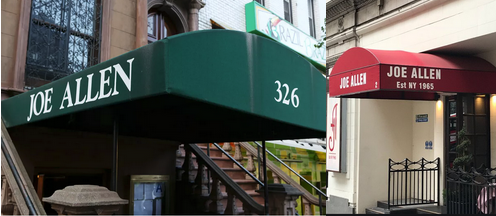Joe Allen’s restaurant is a New York (and London) theatrical institution: a theatrical hang-out for industry types as much as fans of the theatre, mingling two worlds that wouldn’t exist without each other, in an unaffected but knowing way. Yep, the fans go there in the hope that they’ll see someone famous; and (some of) the industry people go there in the hope, no doubt, of being recognised.
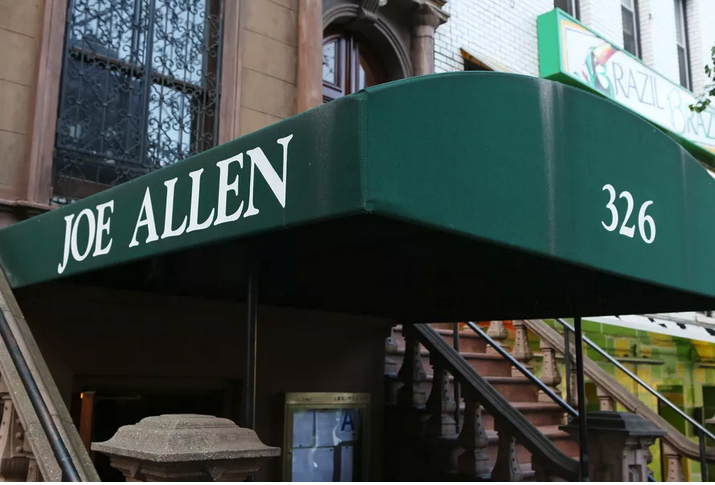
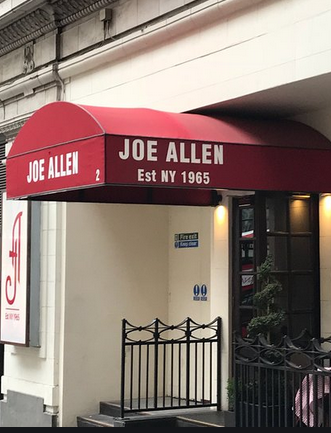
pictured above, Joe Allen’s in New York (on w46th Street) and London (on Burleigh Street, WC2)
You certainly didn’t really go there for the food, which is one notch above New York diner level, with comfort food a high priority — in London I used to love the pork ribs (though I nowadays refuse to eat anything to do with the most lovable — and fourth most intelligent — animal on the planet), while those in the know (and everyone liked to think they were in the know when they went here) would always order the off-menu burger.
A feature in the New York Times this week, following his passing at the age of 87 last Sunday, called his collection of three establishments on 46th Street west of 8th Avenue “like Broadway clubhouses”– the side-by-side Joe Allen’s and Orso’s on street level, with the unmarked brown doors of Bar Centrale at the top of the stone stairs beside Joe’s.
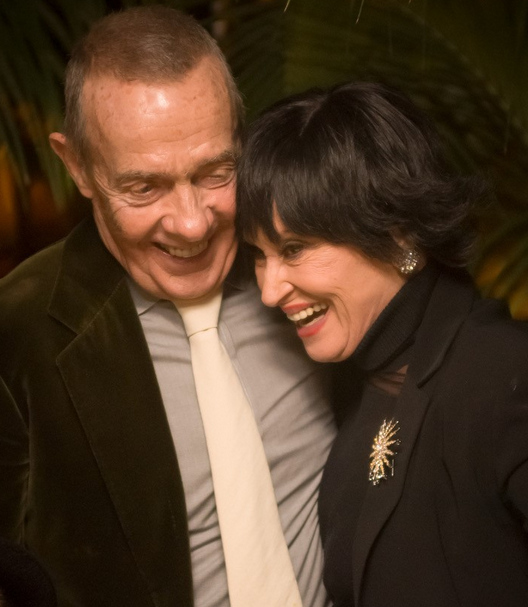
Joe Allen, pictured with Chita Rivera
Though he was famously a private man, the stars came — and not just for the food, but also sometimes his company. As Nathan Lane remembered him, “He was certainly someone who had seen it all. Hell, he even dated Elaine Stritch There should be some kind of Congressional Medal for that. But he dated Chita Rivera as well, so I guess that was his reward.”
Joe Allen opened his first restaurant on NewYork’s East Side, but relocated to West 46th Street, “close to a then-squalid Times Square” in 1965, as the New York Times described it in another piece reporting his death, aged 87, last Sunday. “The street would later develop a certain cachet and even its own name: Restaurant Row,” the paper also explained. But back then, “Mr. Allen also knew he could take advantage of the lower real estate prices in what was then a marginal neighbourhood.” (He ended up owning the four-story building that houses the restaurants, and lived in an apartment above them when he was in town).
Its close proximity to so many Broadway houses gave it an immediate audience to draw on. And it was a canny move to attract actors, for whom the place provided a safe space. As Broadway veteran Donna McKechnie told the New York Times,
“I first met him when I was in, I think it was Promises, Promises. Yeah, ’69. He was very protective. Especially of a young woman coming in alone, which a lot of people did. I went there alone all the time. And this is before the women’s movement. It was a safe place.”
The restaurant also famously celebrates failure: its walls are famously decked only with posters of shows that have flopped. Two beautiful anecdotes from the New York Times piece provide instructive contrasts in now this was received. Justin Ross Cohen, an original cast member of A Chorus Line, remembered applying for a house account in 1976. “When you did, you were given a piece of paper with a form: Name, Company, Position. For Company I put A Chorus Line. For Position, fifth from the left. He got a big kick out of that. It was a big deal! I can’t tell you the number of people who were refused. At 22, I was like, ‘I have arrived!’ I had the good fortune to go from hit to hit for a while. Then I was in a show called Got Tu Go Disco. It was a nightmare. It was such an honour to give Joe that poster to put on the wall” (pictured below).
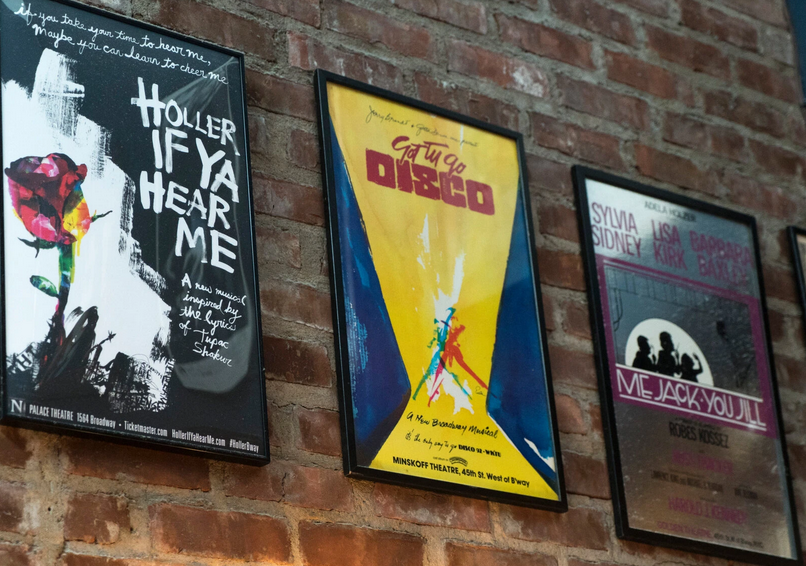
Joe Allen’s restaurant in New York, with the posters of flop shows on the wall
And Broadway darling Kelli O’Hara says this: “I have also looked at the posters on the wall (oh, the dreaded wall) over and over again. I don’t think I’m up there, although I’ve certainly been in flops, so I could be wrong. But I have, admittedly, razzed my friend Will Chase after seeing his High Fidelity prominently displayed. But it’s really a badge of honour to be up there. Working in this business for any length of time means one will have gone through flops, and if we are still standing, that says something. We might as well celebrate it.”
But Patrick Page, who played the Green Goblin in the original Broadway cast of Spider-man: Turn off the Dark, points out that that show never made it onto the wall. “Joe Allen was a member of the Broadway community, not just a restaurateur. I remember him saying that any show that runs for three years and provides employment for that many people, it can’t be a flop.”
The brand was eventually rolled out to other places, including London, Paris, Los Angeles, Miami Beach and Ogunquit. Theatregoing is about a lot more than going to the theatre itself: as Alistair Smith, editor of The Stage, wrote this week, we all have our personal rituals and habits around theatregoing, and for many, he wrote, it’s the pre or post-theatre meal. “The concept of ‘dinner and a show’ is completely embedded in our theatregoing traditions.So, the death of famous Theatreland restaurateur Joe Allen this week feels grimly symbolic. The theatrical equivalent of the ravens leaving the tower. The eponymous restaurants he founded in the theatre districts of New York and London sit astride the worlds of hospitality and live entertainment: two worlds that now lie dormant.”
And he adds, “Joe Allen epitomises the way that – especially in New York and London – theatre and hospitality exist hand in glove.”
And as playwright David Greig, who is also artistic director of Edinburgh’s Royal Lyceum Theatre, put it in an online talk with Elizabeth Newman. artistic director of Pitlochry Festival Theatre as the opening event of this year’s Winter Words Festival there, “The social and ritual part of going to the theatre is huge for us; I hope people will discover this, and not just want to watch things on their screens.”
Theatres are inherently social places: we enjoy being there for more than just the shows we are there to see. It’s why the National Theatre, for instance, which I yesterday named my favourite West End theatre here, is such a great place to go to. You don’t even need a ticket to a show to enjoy being there.

